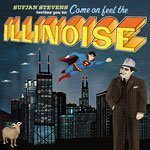
Sufjan Stevens Illinois
(Rough Trade)
What label are we to put on the music of Sufjan Stevens and his new record, Illinois? Folk? Not even close. Americana? Warmer, but tells you nothing. Melancholia? Warmer still, but incomplete. Baroque pop? Very warm, but lacking nuance. How about Baromelancana? Hot!
Mr. Stevens has apparently taken it upon himself to record an album for each of the United States, perhaps including the unincorporated territories of Puerto Rico and Guam and maybe even the soon to be established Kurdistan, Sunniland, and Shiatown in present day Iraq. One might call this project ambitious, and one would be right, especially considering that his second installment clocks in at over 70 minutes. And this isn't "Goodnight Irene" we're talking about here. These are adventurous pop songs with intricate arrangements and sophisticated chord structures. Godspeed Sufjan!
But what exactly is Stevens trying to accomplish here? To create a travelogue you can stick on your ipod and play as you lean your head against the window of a bus cruising down I-55? No, but now that I mention it, that sounds like a pretty good idea. I would look at it more as an evocation, a Pastoral Symphony of the Prairie State. Does he succeed? How should I know? I've only been there once and the highlight of my trip was a colossal rib eye at Morton's. But here is an album as big and juicy as that steak, and every bit as delicious.
To my ears, Stevens has a unique compositional technique. It tends toward a pop minimalism, using circular chord progressions with repetitive embellishments. No matter where you start, you always end up back home, if only for a fleeting moment as you move off in the same or similar direction. As you'd expect, the result has a hypnotic, dreamlike quality but is still restless and shifting, avoiding a Can-like catatonic drone. Beauty, or perhaps grace, is given the highest priority, and some moments approach the sublime, as in John Wayne Gacy, Jr. Reciting the episodic facts of the serial killer's life eventually becomes too much for the singer and, as if he cannot look the unfolding tragedy in the face, his voice surges upward in a desperate falsetto cry "Oh my God". It is a magical moment, effortless and ineluctable.
It's hard to pin down the tone of the album because while many of the arrangements are upbeat, almost celebratory, Stevens' hushed vocals and some imperceptible restraint in the performances undercut the joy. I have no doubt that this is exactly what he was going for, and while you may call it a style, I prefer to think of it as an artistic vision. Every note is too deliberately placed and every instrumental color is too precisely employed to be the product of something as passive as a "style".
As Illinois winds down in a haze of throbbing keyboards, you don't know quite what you've heard, but you're pretty sure it's a triumph. When you end this revolving song cycle you won't want to get off the carousel - you'll just want to go round and round, thinking maybe this time the view will be less blurry and hoping to see the things you missed the first time around.
27 August, 2005 - 23:00 — Alan Shulman